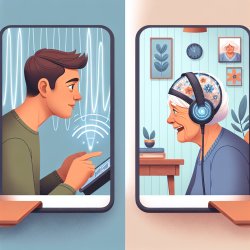Introduction
In the evolving field of speech-language pathology, staying informed about the latest research is crucial for enhancing clinical practice. A recent study titled "Development of a Speech-based Composite Score for Remotely Quantifying Language Changes in Frontotemporal Dementia" offers groundbreaking insights into how remote digital speech assessments can effectively track language changes in individuals with frontotemporal dementia (FTD). This blog will delve into the study's findings and discuss how practitioners can apply these insights to improve outcomes for their clients.
The Study: A Brief Overview
The study involved 36 participants diagnosed with FTD, who underwent remote digital speech assessments over 12 months. The assessments focused on a picture description task, which was analyzed to derive acoustic and linguistic measures. These measures were then used to compute a novel composite score that demonstrated significant changes over time, high test-retest reliability, and a correlation with standard speech tasks.
Key Findings
- Significant Language Changes: The study identified eight variables that showed longitudinal decline in FTD subtypes. These variables were used to develop a composite score sensitive to changes over time.
- Remote Feasibility: The remote digital assessments were found to be feasible, reducing the burden of clinical assessments while providing a sensitive measure of speech and language abilities.
- High Reliability: The composite score showed high test-retest reliability and correlated well with other speech task scores, indicating its robustness as a tool for tracking language changes.
Implications for Practitioners
For speech-language pathologists, these findings highlight the potential of remote digital assessments in clinical practice. By incorporating such tools, practitioners can:
- Enhance Monitoring: Regular remote assessments can provide continuous monitoring of language changes, allowing for timely interventions.
- Reduce Client Burden: Remote assessments eliminate the need for frequent in-person visits, making it easier for clients to participate, especially those with mobility issues.
- Improve Outcome Tracking: The composite score offers a quantifiable measure of language changes, aiding in the evaluation of treatment effectiveness.
Encouraging Further Research
While the study provides a promising framework, further research is necessary to refine these tools and expand their applicability. Practitioners are encouraged to engage in research collaborations to explore the integration of digital assessments in diverse clinical settings.
Conclusion
The development of a speech-based composite score for remotely quantifying language changes in FTD marks a significant advancement in speech-language pathology. By embracing these innovative tools, practitioners can enhance their clinical practice and contribute to better outcomes for individuals with FTD.
To read the original research paper, please follow this link: Development of a Speech-based Composite Score for Remotely Quantifying Language Changes in Frontotemporal Dementia.










